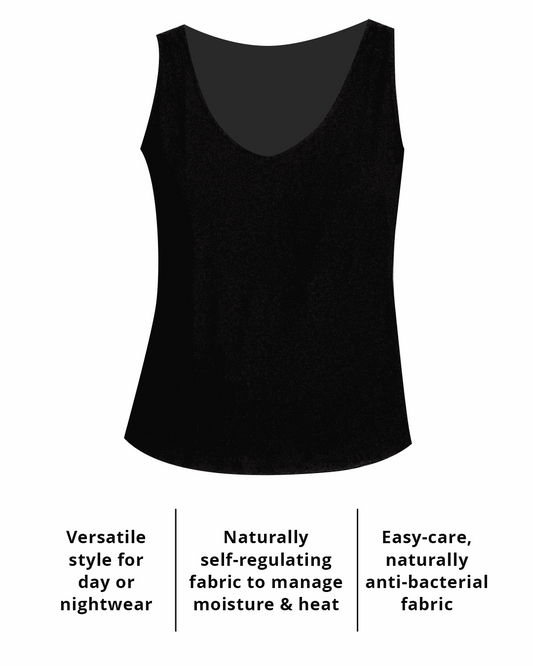
5 Tips For Better Sleeping When You Have Night Sweats
Partager
I suffered terribly from night sweats for over three years before I discovered I could actually do something about them.
At their peak, my night sweats were so bad that I would have been classified as severely sleep-deprived if I’d told my doctor about them. I could barely function during the day and dreaded going to sleep at night. I had taken the “head in the sand” approach where I just wished them away.
When I realized that approach wasn’t working, I looked into what I could proactively do to get rid of them – or at least decrease the severity and frequency. Here’s what I’ve learned.
Tip #1: What and when you drink greatly affects how severe and frequent your night sweats will be
Alcohol
can really increase how many and how severe your night sweats are. If you’re having wine or a cocktail in the evening, limit the amount you drink (everyone’s tolerance is different, so know your own limit), and take your last sip 3 hours before bedtime. The more time between alcohol and sleep, the better. You may have to become a day drinker to get your last sip in before winding down…Kidding! Day drinking is never a good idea!
Caffeine
Like alcohol, too much caffeine will contribute to night sweats. “Too much” varies depending on your own tolerance levels but start monitoring how much you drink and when you drink it. If you believe caffeine is contributing to your night sweats, try weaning yourself off and see if your night sweats improve.

Hot beverages
While it may seem like a great idea to wind down at night with a hot, soothing chamomile tea, or other sleep-inducing beverage, pay attention to how your body reacts to hot liquids. In my case, I drank chamomile tea about an hour before bed.
But I started noticing that a few minutes after I climbed into bed and pulled all the covers up to get cozy, I’d have my first night sweat. I’d just be drifting off when I’d feel the heat start, then I’d feel this heat blast and off would go the covers…and that would be the beginning of the end of my sleep.
Experiment with the beverage temperature and the time you drink it – you might be okay with a warm drink close to bedtime. Otherwise, drink it no later than an hour before bed.
Water
Believe it or not, staying hydrated all day will help dampen night sweats’ severity. You’re probably already familiar with the suggestion of drinking 2 liters of water per day, but you might not know that it needs to be sipped slowly throughout the day in order for the liquid to be absorbed by your body and not flushed by your kidneys.
If you drink it too quickly, your body doesn’t have time to absorb it all, so most of it is flushed down the toilet – literally. There are water bottles out there with markings on them that help you remember to drink a few milliliters per hour, or you can do a makeshift one by marking a glass or bottle with a chalk pen or glass-writing marker with dashes every hour if it helps. Another tip is to prefill a few water bottles every morning and keep them at your desk.
Tip #2: What and when you eat greatly affects how severe and frequent your night sweats will be
Avoid heavy foods at night
Heavy meals containing red meat and animal fats will contribute to night sweats by forcing your digestive system to work overtime. Eat lighter, easily digestible foods for a calmer, less sweat-intensive night.
Spicy foods
spicy foods will also induce sweating, so if you’re a fan, eat them midday, instead of at night if you’re a fan and you may notice your night sweats decrease.
Tip #3: What and when you exercise affects how severe and frequent your night sweats will be
We’re not going into the health benefits of exercise here, suffice it to say, that in addition to all the other great things you get when you exercise, it will also lessen the severity of your night sweats. The key, however, is active movement throughout the day. That doesn’t mean you have to do intense cardio activity to avoid night sweats, but going for a 20-minute walk before work, at lunch and/or after work may help lessen them.
On the flip side, exercising too close to bedtime will pump up your metabolism, and tell your body you’re not ready for bed at all. Ideally, exercise should be done in the morning, but at the latest, try to stick with three hours before bed. That gives your body time to start winding down.
Tip #4: Your room environment affects how severe and frequent your night sweats will be
In addition to all the initiatives you can take during the day, ensuring that you are sleeping in the best possible environment is critical to reducing night sweats. Here are some things you can do:
Cool room temperature
Recommended room temperature is 65F/18C or lower. Sleeping in a cold room with layers will help keep night sweats at bay and reduce their intensity. Our room temperature is around 15C /59F during the winter (I love winter for sleeping!) with a pile of blankets. It’s definitely more difficult in the summer to get a good night’s sleep.
Get some fresh air
Open a window. Fresh air contributes to better sleep by bringing in more oxygen and reducing carbon dioxide build-up. If you live in a noisy and/or bright area use blackout blinds or an eye mask, earplugs, a white noise machine to help block noise and light.
Calm that racing mind
If your mind is racing, meditate or listen to a meditation podcast to calm your thoughts.
Racing thoughts can contribute to anxiety which will contribute to night sweats (the body is complicated). Practice calming your mind, breathing exercises, and counting to clear your thoughts. There are plenty of meditation podcasts available to help you fall asleep as well.
Keep a pen and paper by your bed to write down anything you need to take care of in the morning.
Bedding
Breathable bedding is important for allowing heat and moisture to escape. The best sheets, especially if you prefer sleeping naked, are made from hemp, lyocell or linen. They are the most effective at managing moisture and heat and keeping you dry.
Cotton is acceptable for sheets if you wear sleepwear. If you don’t, you might find you wake up damp or wet every morning. Cotton loves water and hates letting go of it. Also, a higher thread count means the weave is much tighter, allowing for less air circulation. When it comes to night sweats, a low to medium thread count (250-300) and high-quality long-staple fibre/extra-long staple fibre cotton sheet is best for breathability.
Tip #5: Your sleepwear needs to manage heat and moisture
Breathable, moisture-wicking, heat-managing sleepwear will keep you the most comfortable through sweats.
Like sheets, the sleepwear you choose should not only be comfortable but also wick heat and moisture away from your body as quickly as possible so it doesn’t stay next to your skin. The best fabrics for this are hemp/cotton, linen, and lyocell.
Everyone’s body reacts differently to activities and food and drink. Hopefully, some of these common triggers will give you ideas about what might be contributing to your night sweats. If you would like to read more and figure out what’s contributing to yours, get our night sweats journal. It will help you keep track of your food, activity and, bedtime routine/environment so you have a clearer picture of what’s causing them.
You might also like:
What Not To Sleep In If You Suffer From Night Sweats
5 Tips for Better Sleep Using Fabric
The Best Medicine for a Long and Healthy Life




